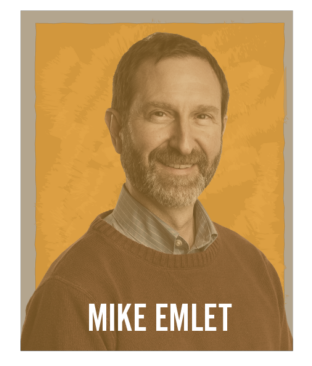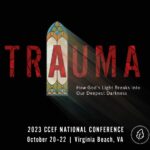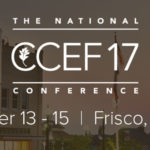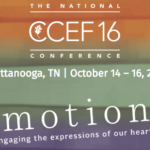Mike Emlet’s General Session was about trauma’s effect on the body. “Trauma is one of those places where suffering deeply impacts the body.” Dr. Emlet recounted how in his earlier days he butchered a ministry opportunity with a vet, by not being attentive to his bodily suffering. “In helping traumatized individuals, we don’t want to care well for the soul but ignore the body. Nor do we want to care well for the body but ignore the soul. As we see in scripture, body and soul are inextricably linked. And so our approach to sufferers must be wholistic.”
Why is it important for us to know the effects of trauma on the body?
- It helps a trauma sufferer realize I’m not crazy.
- It helps sufferers realize bodily reaction is a result of suffering, not sin or bad character.
- It alerts helpers to look for bodily manifestations.
- If the body is part of problem, then the body is part of the solution as well.
As John Murray reminds us, we don’t just have a body, we are a body. Psalm 139:13-14. “Are bodies are part of God’s pronouncement, this is very good. But it doesn’t take long before things go terrible wrong.” We are both fallen in body and soul.
In what ways do our bodies manifest the effects of trauma?
- Intrusions – can include memories and nightmares. A person who survived a car accident can have a panic attack when they hear tires on pavement.
- Dissociation- where it’s like a victim switches off. Even a smell can bring someone back to a traumatic experience. Flashbacks can occur where it feels like the event is happening to a victim right now.
- Alterations in arousal or hyperactivity. Hypervigilance.
- Difficulty concentrating and sleeping.
What is the result of these traumatic experiences being so profoundly intense? At the very least, it leads to the difficulty of a survivor being fully present. It’s like a parent who has a young child tugging on her sleeve when she’s trying to have a conversation… That’s not true dissociation but it gives us a feel for someone’s whose body experiences intrusions.
Mike talked about how our brain functions. Our brains have several structures associated with emotion, memory and bodily arousal. Our amygdala helps us detect danger. Like a fire alarm in the face of a threat, our bodies produce a fight or flight response. Sensory information from our environment is converging on our thalamus. And the hippocampus also works to process memory. Stress hormones are released when danger is sensed. The parasympathetic nervous system takes over to calm the body down when the threat has passed.
This is an intricate and glorious system. “It’s a blessing that our bodies can react to danger before we can even process the threat cognitively.” This may even save our lives. But with trauma this finely tuned system often goes awry and does not return to baseline. Our bodies can be shouting very loudly in a posttraumatic setting.
When dealing with trauma, we must remember that people recollect their traumatic events differently than other events in their lives and have difficulty talking about it. There may be narrative without a beginning, middle, and end. “Don’t be surprised if there are gaps in a person’s memory… Expect that they will have difficulty putting words to their experiences.” Trauma survivors have an altered relationship with their bodies. They may feel too much or too little. They may be on overdrive or perhaps the opposite extreme, exhibit a numbness.
Ultimately in glory, we will have fully renewed bodies that work properly. The deathly experience that trauma represents does not have the final word because of the resurrection of Jesus Christ from the dead. That gives us ultimate hope.
Mike talked about how we can make the body an ally rather than a foe. “The Christian hope is not escape from the body but the use of our bodies as vessels of worship and service, both in this life and in the life to come.” (Romans 12:1.)
Worship in both the Old and New Testament involved the use of our bodies. Baptism and the Lord’s supper are means of grace that involve our bodies. “This is biblical warrant for the proactive use of our bodies in relationship with God. Regular bodily practices are meant to tutor the hearts of God’s people toward him and toward God’s kingdom. They are embodied ways of knowing.” We get to taste and see that the Lord is good. Psalm 34:8.
Similarly, we can use the body as an ally in experiencing God. Mike gave two examples: deep breathing and grounding.
- Deep breathing – We don’t do deep breathing as an activity in and of itself, but we do it reminding ourselves of God’s deep care and how in Him we live and move and have our being. Several deep breathing cycles can be instrumental in calming a run away body.
- Grounding – helps a person focus on the here and now. Have a person notice things around them that they can touch, see, taste, smell. Can we assist in slowing a person’s body down and help them pivot so they know the Lord’s presence? For example, look around the room to remind ourselves of God’s love. Perhaps we notice a beautiful rock and compare how God is like a rock.
There may be other treatments that may be helpful: such as EMDR, muscle relaxations, medications, or bio-feedback. We appreciate symptomatic relief to help calm the winds down. Our goal is to orient a person to the present and give them a God-centered perspective.
Jesus often performed bodily healing and then uses that as a point of contact for salvation. Body and soul healing often went hand in hand. Healing broken bodies and sin were twin marks of God’s kingdom. While the healings were acts of mercies, they pointed to the healer. Physical healing was to orient a person towards King Jesus.
A redemptive view of the body means we are rightly interested in helping a sufferer regain physical stability. And we are aiming for more than that, we want to see whole person engagement with the living God. Our ultimate aim is a person’s growth in Christ, with faith working itself out in love.
While our bodies may keep the score, Mike reminds us of our hope. “Trauma sufferers who know Jesus are destined for more.” We must remember that glory is the end of the story. Jesus wins. Love wins and light wins.
<< View the other CCEF23 main session summaries here. >>







